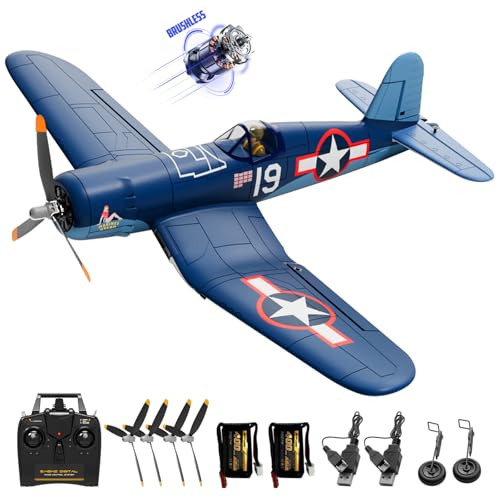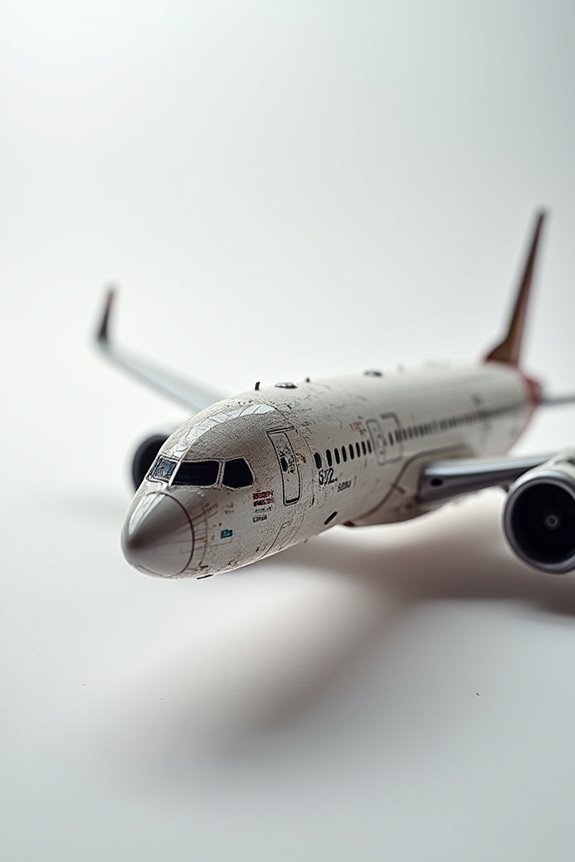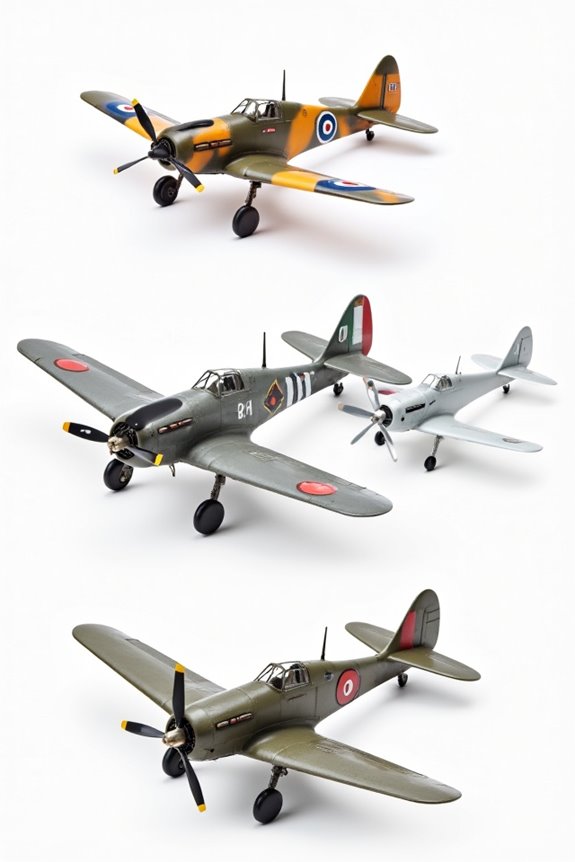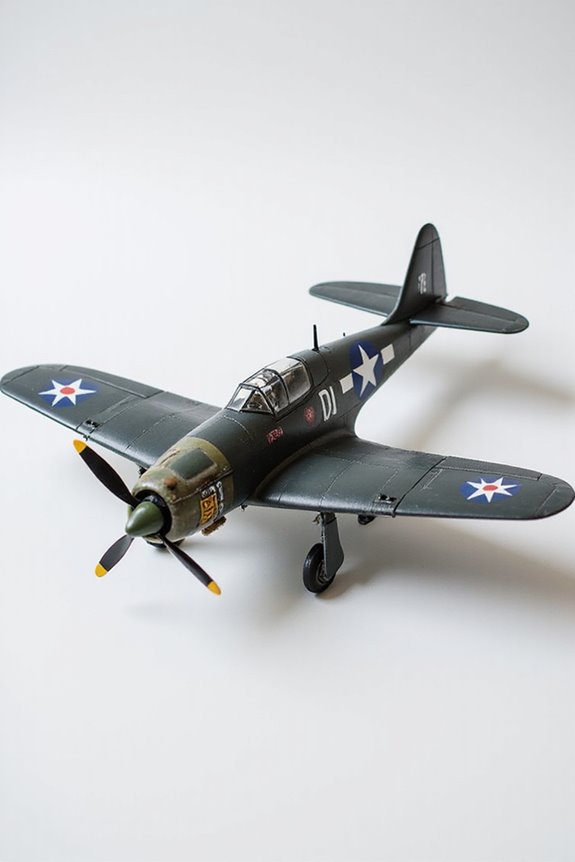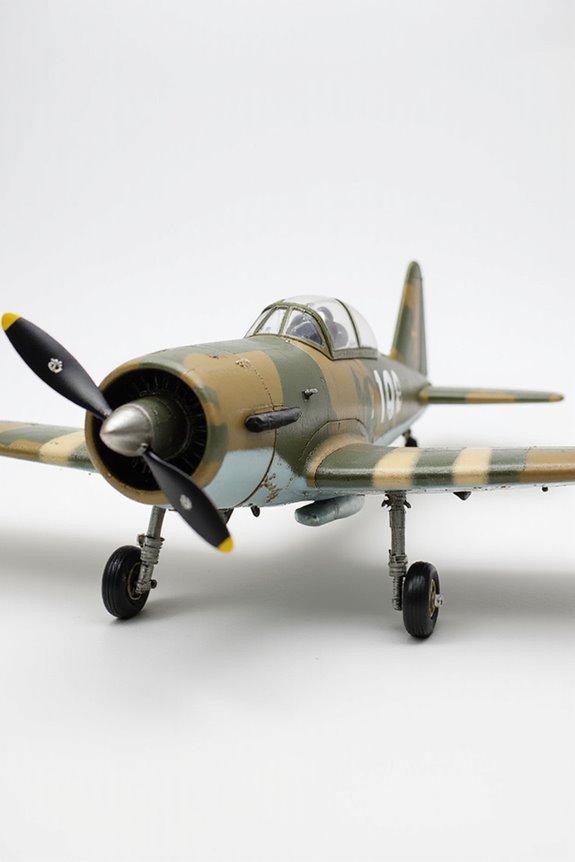As an Amazon Associate, we earn from qualifying purchases. Some links may be affiliate links at no extra cost to you. Although our opinions are based on curated research, we haven't used these products. Articles generated with AI.
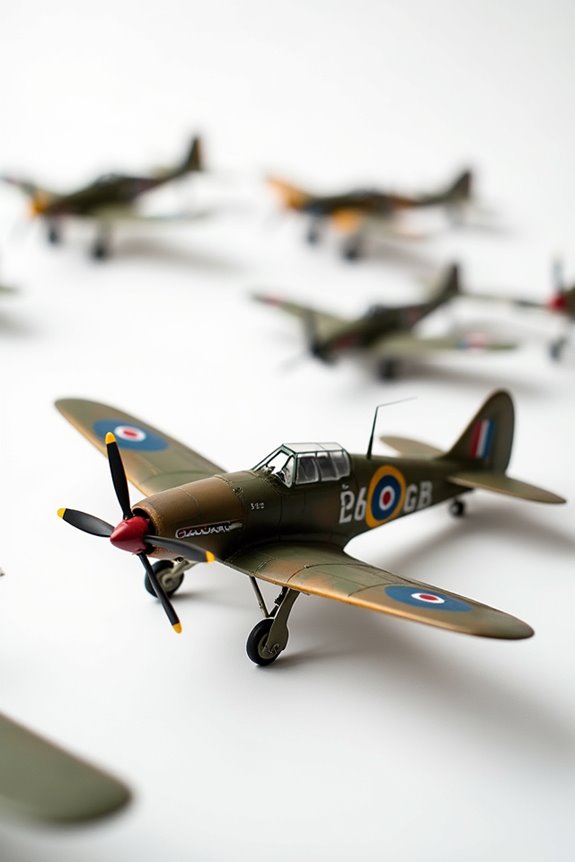
5 Best RC Planes for Beginners: Your Ultimate Starter Guide
If you’re diving into the world of RC planes, you’ve got some fun choices ahead! The VOLANTEXR F4U Corsair is beginner-friendly with three flight modes and easy battery swaps. For a starter, consider the TOC Metal Roto Terminator; it’s reliable with a solid torque of 120KG/CM. Lightweight options like the Hangar 9 PowerPro HD are easy to transport. Each has unique features that make flying enjoyable. Stick around, and you’ll discover the full scoop on these amazing models!
Key Takeaways
- Start with the VOLANTEXR F4U Corsair, ideal for beginners due to its three flight modes and ease of use after battery installation.
- The TOC Metal Roto Terminator Starter provides high torque support for larger engines, ensuring reliable performance with a 12V-18V battery.
- Consider the Hangar 9 PowerPro HD Starter, lightweight and convenient, backed by a 2-year warranty for enhanced durability assurance.
- Ensure your starter’s engine compatibility to prevent damage and match specs with your engine requirements for optimal performance.
- Prioritize portability and weight in your choices to facilitate easy transport and setup between different flying sites.
TOC Metal Roto Terminator Starter for RC Airplanes
VQP TOC Metal Roto Terminator Starter, 20-80CC Gasoline Engine Starter, RC Airplane Part
- Designed for 20CC-80CC gasoline engines
- Power Supply: 12V-18V
- Free Speed: 1000RPM/H
If you’re diving into the world of RC planes, the TOC Metal Roto Terminator Starter is your go-to companion. Designed to power engines from 20CC to 80CC, this starter’s got torque for days—120KG/CM, to be exact. Imagine it like a coffee boost for your aircraft!
At 3.6 pounds, it’s sturdy but not too hefty. Need a power supply? You’ll want a 12V-18V battery, and it works like a charm. Many users rave about its reliability and performance, although keep an eye out for that button switch. Grab one, and let the skies be your playground!
Best For: RC airplane enthusiasts aged 16 and up looking for a reliable and powerful starter for 20CC-80CC gasoline engines.
Pros:
- Effective performance with Saito 90 R3 engine and powerful torque for efficient startups.
- Unique starter cup design prevents damage to painted surfaces while accommodating larger spinners.
- High-quality construction noted for durability and reliability, with fast delivery experiences reported by users.
Cons:
- Some users experienced issues with the button switch functionality, potentially affecting ease of use.
- Reports of loose screws which may require periodic tightening for optimal performance.
- The starter’s weight at 3.6 pounds can make it challenging to stabilize the airplane without assistance during use.
VOLANTEXR F4U Corsair Brushless RC Plane (500mm, RTF)
rcxsuv VOLANTEXR Brushless RC Plane 4 Channel - F4U Corsair 500mm RC Airplane with 3D Aerobatic &...
- [Brushless RC Plane for Adults] Experience smooth and enjoyable flight powered by Xpilot gyro stabilization. The brushless motor delivers powerful yet smooth thrust for...
- [3-Level Flight Control] This remote control airplane is suitable for both beginners and seasoned enthusiasts, features a 3-level flight control system. The beginner...
- [F4U Corsair Military-Grade Realism] Upgraded functional details include realistic landing gear(durable spring steel), steerable rear-wheel clutch control for precise...
Looking for an RC plane that’s perfect for beginners? The VOLANTEXR F4U Corsair Brushless RC Plane has you covered. It’s got a 6-axis gyro and three flight modes—Beginner, Intermediate, and Expert. This means you can start with full assistance and gradually grow into expert maneuvers without sending it plummeting!
You’ll enjoy a high-torque brushless motor that pushes faster climbs and longer flights. With realistic warbird styling and easy battery swaps, you’ll be up in the air in under a minute. This plane is the perfect wingman for learning the ropes of flying with style!
Best For: The VOLANTEXR F4U Corsair Brushless RC Plane is best for beginners and adults looking to learn RC flying with a user-friendly and stylish aircraft.
Pros:
- Smooth Learning Curve: Three-level flight control system allows gradual skill development from novice to expert.
- Extended Flight Time: High-torque brushless motor offers faster climbs and up to 15 minutes of flight time.
- Ready to Fly: Fully assembled and requires minimal setup, enabling quick flights after battery installation.
Cons:
- Limited Advanced Features: May not satisfy experienced pilots looking for more complex flying capabilities.
- Durability Concerns: As with many RC planes, potential wear and tear may occur with frequent use.
- Battery Replacement: While maintenance ports ease battery swaps, the availability of replacement batteries could be an issue.
TOC Metal Roto Terminator Starter for RC Airplane
VQP TOC Metal Roto Terminator Starter, 20-80CC Gasoline Engine Starter, RC Airplane Part
- Designed for 20CC-80CC gasoline engines
- Power Supply: 12V-18V
- Free Speed: 1000RPM/H
The TOC Metal Roto Terminator Starter is a game-changer for those diving into the world of RC airplanes. This powerhouse starter is designed for 20CC-80CC gasoline engines, providing an impressive free speed of 1000 RPM and a torque of 120KG/CM. That’s enough to start up your airplane without fuss!
Weighing in at 3.6 pounds, it fits comfortably in your hands, but don’t be surprised if you need an extra set of hands for stability! With a solid average rating of 4.7 stars, it’s praised for its reliability, and the innovative starter cup design won’t scratch your paint.
Best For: The TOC Metal Roto Terminator Starter is best for experienced RC airplane enthusiasts seeking a reliable starter for their 20CC-80CC gasoline engines.
Pros:
- Effective performance with powerful torque, making it reliable for starting various engine sizes.
- Unique starter cup design prevents damage to painted surfaces during use.
- High-quality construction noted by users, ensuring durability and reliability.
Cons:
- Some users reported issues with the button switch functionality and loose screws.
- Weighing 3.6 pounds may require assistance for stabilization during use.
- A few users found it heavier than expected, which could be a drawback for portability.
Hangar 9 PowerPro 12V Starter HAN161 Air Field Equip & Electronics
Hangar 9 PowerPro 12V Starter HAN161 Air Field Equip & Electronics
- Reliable high-power 12V DC motor
- For airplanes, cars, boats or helicopters
- Convenient and easy to operate
For anyone diving into the world of remote control planes, the Hangar 9 PowerPro 12V Starter (Model: HAN161) stands out as a must-have tool. This little powerhouse has a reliable high-power 12V DC motor. It’s versatile enough to start not just planes, but cars, boats, and helicopters, too!
With a high-torque output, it effortlessly ignites engines up to 1.8 cubic inches. Weighing in at just 3.37 pounds and measuring 8.2 x 4.9 x 3.2 inches, it’s compact enough to fit in your airfield kit. Just toss it in with the silicone insert, and you’re ready to fly—reliability guaranteed!
Best For: Hobbyists and enthusiasts aged 14 and up who need a reliable starter for their remote control planes, cars, boats, and helicopters.
Pros:
- Powerful high-torque 12V DC motor capable of starting engines up to 1.8 cubic inches.
- Compact design makes it easy to carry to airfields or events.
- Includes a silicone rubber insert for added convenience and secure mounting.
Cons:
- Some users have reported issues with durability over time.
- Limited to starting engines within a specific cubic inch range.
- Warranty is available only upon request, which might be inconvenient for some customers.
Hangar 9 PowerPro HD 12V Starter HAN162 Air Field Equip & Electronics
Hangar 9 PowerPro HD 12V Starter HAN162 Air Field Equip & Electronics
- Reliable high-power 12V DC motor
- For airplanes, cars, boats or helicopters
- Convenient and easy to operate
Need a reliable starter for your RC engines? The Hangar 9 PowerPro HD 12V Starter (Model: HAN162) is a game changer. With a powerful 12V DC motor, it cranks out an impressive 248 oz/in of torque! This means it can handle engines up to 1 cubic inch without breaking a sweat.
Easy to use, it mounts conveniently to the Power Pro Portasource. Plus, the included silicone rubber insert gives you a secure grip. Weighing just 1.89 pounds, it’s lightweight yet durable. Backed by a 2-year warranty, it’s a dependable choice for anyone diving into the exciting world of RC flying!
Best For: Hobbyists and RC enthusiasts looking for a reliable and high-torque starter for their engines.
Pros:
- High torque output enables starting of larger engines, providing reliable performance.
- Lightweight design at 1.89 pounds makes it easy to handle and transport.
- Includes a 2-year warranty, ensuring peace of mind for users regarding product durability.
Cons:
- Some users report that the rubber insert wears out quickly, affecting usability.
- Mixed reviews regarding torque performance, with some expecting more power for larger engines.
- While fast shipping is praised, the product’s availability may vary, affecting prompt access.
Factors to Consider When Choosing an RC Plane Starter
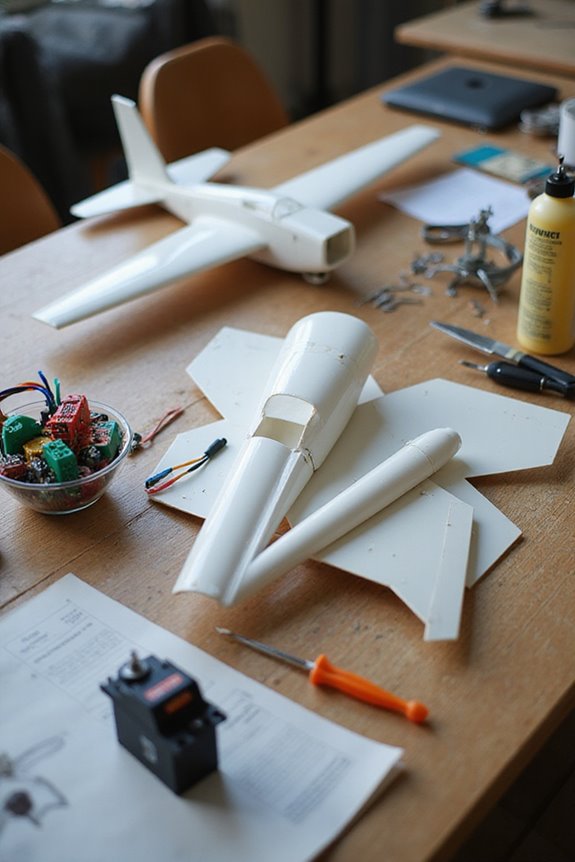
When you’re picking a starter for your RC plane, a few key factors can make or break your flying experience. You’ve gotta consider engine compatibility, power supply options, and how much torque you’ll need for solid performance. Plus, think about weight and durability—because nobody wants their plane to go down after a shaky takeoff!
Engine Compatibility Requirements
Choosing the right RC plane starter is essential if you want your flights to go as smoothly as a freshly oiled gear. Make sure your starter matches the engine size, typically between 20CC to 80CC for gasoline engines. You wouldn’t want a tiny starter trying to muscle up a big engine, right?
Check the power requirements too; many starters work best with a 12V-18V battery, like lead-acid or lithium types. A 40A working current is ideal for larger engines that need high torque. Finally, consider the starter’s free speed and max torque: around 1000 RPM and 120 KG/CM can make all the difference. Don’t forget about compatibility with your engine’s design to avoid paint damage during starts—your plane deserves that extra care!
Power Supply Options
Power supplies can make or break your RC plane experience. You’ll want to stick with a power supply that runs between 12V and 18V. For starters, a lead-acid battery or a lithium battery rated at 3S/3000mAh or above is your best bet. Remember, discharge rate matters, so look for 20C or higher to keep things zipping along.
Many starters need up to 40A, so don’t shortchange yourself with an underpowered battery. It’s like trying to run a sports car on vegetable oil—just won’t work! Match your battery’s specs to your RC plane for smoother engine starts. If the battery isn’t within the recommended range, prepare for disappointing performance and possible damage. So, choose wisely!
Torque and Performance
Torque is essential for getting your RC plane’s engine roaring to life. Think of it as the muscle behind your starter. Higher torque ratings, like 120KG/CM, are critical for cranking larger engines effectively. This means you can count on reliable performance when you need to fire up that beast!
Aim for a starter with around 40A of working current. This guarantees your gear can power through the ignition demands. A free speed of around 1000 RPM/H is also important; it speeds up the engine’s rotational acceleration, getting you in the air quicker. Make sure your starter is compatible with engine sizes from 20CC to 80CC, so you can tackle a variety of models without any issues. Happy flying!
Weight and Portability
When it comes to RC plane starters, weight really matters—especially if you plan to haul it around. Equipped models usually weigh between 1.89 pounds and over 3.6 pounds. A lighter starter not only simplifies transport but also makes setup a breeze, especially if you’re hopping between flying sites.
Durability and Build Quality
Durability and build quality are the backbone of any good RC plane starter. When you inspect an RC plane, look closely at the materials used. High-quality components can make all the difference. They resist wear and tear from the many crashes you’ll surely have—don’t worry, we’ve all been there!
Next, check for reliable high-torque output. This means your starter can handle larger engines without flaking under pressure. Weigh the starter, too; heavier models might need stability. You don’t want it veering off like a bad pilot!
Lastly, read user reviews for clues on long-term reliability. If they’re complaining, you might want to steer clear. Compatibility with various engine sizes also hints at a sturdy build. Happy flying!
Price and Warranty Considerations
Even though price might not be the first thing that comes to mind when you’re dreaming about that shiny new RC plane starter, it’s an indispensable factor you shouldn’t ignore. Prices can vary widely, so it’s important to set a budget. Don’t just chase the lowest cost, though; some higher-priced options deliver superior reliability and performance.
Always check if a warranty backs your purchase. Reputable brands often offer warranties to cover defects, which is a lifesaver.
Be sure to compare specifications too. You want to verify that the price aligns with the plane’s performance capabilities, like torque and engine compatibility. Finally, look for price-matching policies for extra savings. After all, we want value, not just a bargain!
Frequently Asked Questions
What Is the Best RC Plane for Windy Conditions?
Flying in the wind can feel like trying to juggle spaghetti on a roller coaster—challenging but exciting! When it comes to RC planes, look for models with a low wing loading and a robust design, like the HobbyZone Sport Cub S. They handle gusts better and give you control rather than turning your aircraft into a kite. Just remember, a little wind can enhance the thrill, but too much can spell trouble!
How Long Does It Take to Learn to Fly an RC Plane?
When you’re learning to fly an RC plane, expect about 10 to 20 hours of practice before you feel comfortable. You’ve got to master basics like takeoffs, landings, and turns. Each session builds your skills, so stick with it! Think of it like riding a bike—wobbly at first, but soon you’ll be cruising. Just remember, patience is key. With a little practice, you’ll be soaring through the skies in no time!
Are Electric RC Planes Better Than Gas-Powered Models?
Electric RC planes are often preferred for their convenience and quiet performance. They’re cleaner and simpler, kinda like a microwave versus a campfire! Gas-powered models offer longer flight times and more power, yet they require more maintenance and fuel. If you want easy handling and quick setup, electric’s the way to go. But if you crave the raw roar of a flying beast, gas could tickle your fancy! What’s your flying style?
What Features Should I Look for in a Beginner-Friendly RC Plane?
When you’re looking for a beginner-friendly RC plane, focus on stability and ease of control. A high wing design gives you better lift and helps you glide smoothly. If it has a lightweight construction, that’s a bonus—it makes crashes less tragic! Go for foam materials; they’re tough yet forgiving. Finally, a ready-to-fly (RTF) model means you won’t spend hours assembling, which is great for your first flight. Happy flying!
Do I Need a License to Fly RC Planes?
You don’t need a license to fly RC planes in most places. However, you should check local regulations first. The FAA requires registration if your plane weighs over 250 grams (about half a pound). Think of it like flying a kite; no special permits unless it gets really big! Also, practicing safe flying and being aware of where you fly makes you a responsible pilot. So, go ahead, and enjoy your flying adventures!


